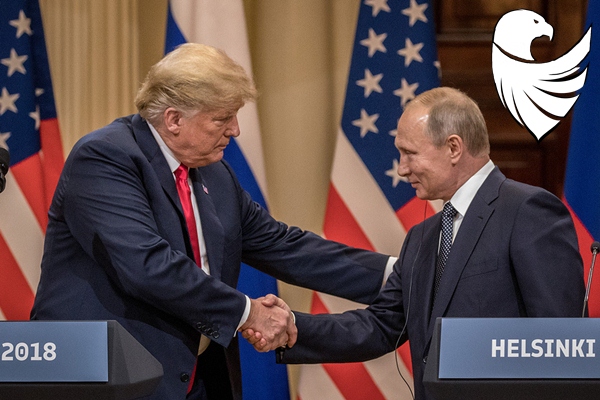
Tensions between Russia and the Senate are rising after President Donald Trump’s latest outreach to Moscow, with the Kremlin barring senators in both parties from visiting and Democrats urging Trump to keep Russia out of the G-7.
Sens. Chris Murphy (D-Conn.) and Ron Johnson (R-Wis.), both members of the Foreign Relations Committee, said Russia denied their visas as part of a congressional delegation. A third senator, Republican Mike Lee of Utah, is planning to travel to Russia next week but hasn’t had his visa granted or denied yet, a spokesman said Tuesday afternoon.
Those revelations were quickly followed by Senate Minority Leader Chuck Schumer and other Democrats arguing to Trump that “under no circumstances” should Putin be allowed to take part in the meeting of the leaders of major industrial nations. In 2014, Russia was expelled from the organization, then known as the Group of Eight, after illegally annexing Crimea.
Murphy warned in a statement Tuesday morning that denying visas to members of Congress could further stymie dialogue between the United States and Russia. He emphasized that it’s in the world’s best interest to prevent conflict between the two countries.
“Unfortunately, the Russian government is further isolating their country by blocking our visit and several others in recent months,” Murphy said. “ With the collapse of recent arms control agreements and significant domestic opposition to Vladimir Putin’s authoritarian rule, this is potentially a perilous moment for our two nations’ fragile relationship.”
Lee is scheduled to meet with outgoing U.S. Ambassador to Russia Jon Huntsman, Jr., in Moscow next week, Lee’s spokesman said. Huntsman is a former governor of Utah.
Russia’s barring senators and Schumer’s letter, taken together, heighten the already fraught relationship between Congress and Putin even as Trump pushed for Putin’s inclusion into the G-7.
“The state of affairs is very poor,” said Sen. Marco Rubio (R-Fla.), who said he’d never applied for a visa.
The Russia hawk didn’t rule out the possibility of Russia joining the G8 given the country’s nuclear arsenal and place on the United Nations Security Council, but questioned whether Putin had done anything to change his country’s behavior.
“We can’t ignore Russia or stop dealing with them but we should do so with clear eyes. But it’s something we need to talk to other members states as well,” he told reporters at the Capitol on Tuesday. “I don’t know about what the rationale is about now, none of the behavior that got them kicked out of the G8 has changed.”
Johnson also said Monday evening that he too was denied entry to the country; the Wisconsin senator was part of a Republican delegation that visited last summer.
On Monday night, Johnson criticized Putin, including for failing to hold free and fair elections, supporting Syria and annexing Crimea.
Johnson said that while he hoped that he could work with Huntsman to improve the United States’ relationship with Russia, “Russian officials continue to play diplomatic games with this sincere effort and have denied [him] entrance to Russia.”
The Wisconsin Republican, who chairs the Senate Foreign Relations Subcommittee on Europe and Regional Security Cooperation, has pushed and co-sponsored legislation to get tough on Russia for its actions in Ukraine but votedagainst keeping some sanctions on Russia earlier this year.
In 2015, Russia banned several members of Congress, including Sen. John McCain (R-Ariz.), who was then chairman of the Armed Services Committee, from entering the country. McCain had supported sanctions against the country for invading Crimea.
The denial of visas to the senators highlights an ongoing conflict between members of the Senate and the White House when it comes the United States’ relationship with Russia.
Trump said on Monday his “inclination is to say yes, [Russia] should be in” the G-7, again rattling U.S. beliefs that the country should remain on the sidelines of the international group. Trump said there were discussions in France about the matter and that he found agreement that “having them inside the room is better than having them outside the room.”
In the letter to the president, Schumer and other Democratic leaders argued that is misguided because “Russia does not currently possess the democratic institutions nor the economic capacity to rejoin the group.”
The Democrats argued that since its expulsion, Russia has done little to prove itss worth by meddling in U.S. elections, supporting the states of Syria and Venezuela, and stifling political debate in Russia.
“For these reasons, under no circumstances should President Putin be invited to participate in the G-7 until the Russian government undertakes demonstrable actions to show its willingness to behave responsibly both domestically and abroad,” they wrote. “Readmitting Putin’s Russia to the G-7 would be contrary to our values and a clear abdication of the United States’ responsibilities as the world’s leading democracy.”
The letter was also signed by Sens. Jack Reed of Rhode Island, Mark Warner of Virginia, and Bob Menendez of New Jersey, who lead Democrats on key national security committees.
By MARIANNE LEVINE and BURGESS EVERETT
Source: politico.com
See more here: conservatives
